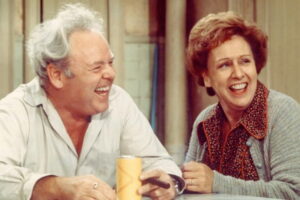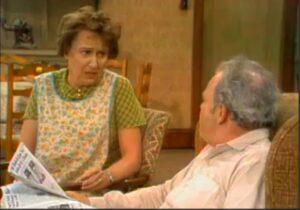The Unprecedented Decision to Kill Edith Bunker
Losing a major character from a beloved television series rarely happens without consequences. When it does occur, the results can range from disastrous to surprisingly successful. However, nothing in television history compares to the emotional devastation caused by the off-screen death of Edith Bunker on ‘Archie Bunker’s Place’. This moment stands as one of the most impactful character departures in television history, leaving audiences heartbroken and forever changing how shows handle major cast exits.
The decision to kill off Edith Bunker wasn’t made lightly. It came after years of careful negotiation, emotional discussions, and one actress’s determination to break free from a role that threatened to define her entire career. Jean Stapleton’s departure from the show represents a pivotal moment in television history, demonstrating the complex relationship between actors and their iconic characters.

‘All in the Family’: A Revolutionary Series
‘All in the Family’ premiered in 1971 and quickly became a cultural phenomenon. The show revolutionized television by fearlessly tackling controversial topics through the lens of the Bunker family. At its heart was the dynamic between conservative bigot Archie Bunker, portrayed brilliantly by Carroll O’Connor, and his sweet but naive wife Edith, whom Jean Stapleton brought to life with warmth and authenticity.
The chemistry between Archie and Edith formed the emotional core of the series. While Archie’s conflicts with his liberal son-in-law Mike “Meathead” Stivic, played by Rob Reiner, provided much of the show’s social commentary, it was Edith’s unconditional love for Archie that made him sympathetic despite his prejudices. Jean Stapleton’s performance transformed what could have been a one-dimensional character into a beloved television icon.

The Exodus: Cast Members Leave One by One
By the end of Season 8, cracks began appearing in the show’s foundation. Rob Reiner and Sally Struthers, who played daughter Gloria, announced their departures. They felt they had explored their characters fully and wanted to pursue other opportunities. This exodus created uncertainty about the show’s future, but the real blow came when Jean Stapleton announced that Season 9 would be her final season.
The loss of these core cast members forced creator Norman Lear and CBS to make difficult decisions. Could ‘All in the Family’ survive without the Stivics? More importantly, could it continue without Edith? Carroll O’Connor believed the show could evolve, but Lear had serious reservations about proceeding without the character who provided the show’s emotional heart.

The Birth of ‘Archie Bunker’s Place’
Norman Lear reluctantly agreed to continue the series under strict conditions. The show would be renamed ‘Archie Bunker’s Place’ and focus on Archie’s new venture as a bar owner. The iconic theme song “Those Were the Days” could no longer be used, symbolically marking the end of an era. Most importantly, even though Jean wouldn’t participate regularly, Edith had to remain alive off-camera to preserve the possibility of her return.
Jean Stapleton surprised everyone by appearing in five of the first fourteen episodes. However, she quickly realized that these guest appearances were preventing her from moving forward professionally. She needed to make a clean break from Edith Bunker, regardless of how beloved the character had become.
Why Jean Stapleton Had to Leave
In her interview with the Archive of American Television, Jean Stapleton provided candid insight into her decision. “I had to leave or risk being buried as far as casting is concerned in this kind of part,” she explained. The fear of typecasting haunted her. Despite her extensive theatrical background and versatile acting abilities, Jean recognized that continuing as Edith would permanently limit her career opportunities.
This decision reflects a common dilemma faced by actors in long-running series. While iconic roles bring fame and financial security, they can also create professional imprisonment. Jean understood that staying would mean sacrificing her artistic growth and future possibilities. It was a painful but necessary choice.
The Phone Call That Changed Everything
A year after Jean’s departure, producer Bud Yorkin called to confirm she truly wouldn’t return. When she firmly declined, Norman Lear himself reached out to discuss killing off Edith’s character. This conversation revealed the deep emotional connection Lear had developed with the fictional character.
Jean recalled their exchange with remarkable clarity. “I said, ‘Norman, you realize, don’t you, that she’s only fiction?'” The long pause that followed spoke volumes about Lear’s emotional investment. When he finally responded, “She isn’t to me,” Jean understood the profound impact Edith had made not just on audiences but on the show’s creator himself.
Despite his emotional resistance, Norman eventually gave his blessing. The decision to kill Edith off-screen through a stroke would allow the show to address her absence definitively while giving Archie a powerful storyline about grief and loss.
The Slipper Scene: Television’s Most Moving Moment
The second season premiere of ‘Archie Bunker’s Place’ opened months after Edith’s death. Throughout the episode, Archie stubbornly refused to acknowledge his grief, sleeping on the couch and avoiding their bedroom. In the final scene, after finally allowing the bedroom to be cleared, Archie discovered one of Edith’s slippers.
What followed became television legend. Carroll O’Connor delivered a heart-wrenching monologue to the slipper that showcased his extraordinary talent. The raw emotion in his performance resonated with millions of viewers who had also experienced loss. This scene demonstrated that sitcoms could handle serious emotional moments with the same depth as dramatic series.
The Maid’s Reaction: Life Imitating Art
Jean Stapleton shared a touching postscript to the story. The night the episode aired, she was staying in a hotel in Winston-Salem, North Carolina, for a theater reopening. She watched Carroll’s powerful performance from her hotel room, moved by his tribute to Edith.
The next morning, when the hotel maid entered her room, the woman’s jaw dropped. “My God, I thought you were dead,” she exclaimed. This reaction perfectly captured how deeply audiences connected with Edith Bunker. To millions of viewers, she wasn’t just a fictional character but a real person they had invited into their homes for nearly a decade.
The Legacy of Edith Bunker’s Death
Edith Bunker’s death changed how television handled major character departures. The decision to kill her off-screen rather than write her out through divorce or relocation felt more honest and emotionally resonant. It allowed the show to explore grief authentically while respecting Jean Stapleton’s need to move forward professionally.
The episode demonstrated that sitcoms could tackle serious subjects like death and mourning without losing their essential character. Carroll O’Connor’s performance proved that comedy actors possessed the dramatic range to handle profound emotional moments, paving the way for future shows to blend humor and pathos more effectively.
Conclusion: A Necessary Goodbye
Jean Stapleton’s decision to leave ‘All in the Family’ and allow Edith Bunker to die represents one of television’s most bittersweet moments. While audiences mourned the loss of a beloved character, Jean’s choice enabled her to continue growing as an artist and avoid the typecasting that has trapped so many talented performers.
The death of Edith Bunker reminds us that sometimes the most loving thing an actor can do for themselves is walk away from a role that defines them, no matter how beloved that character might be.